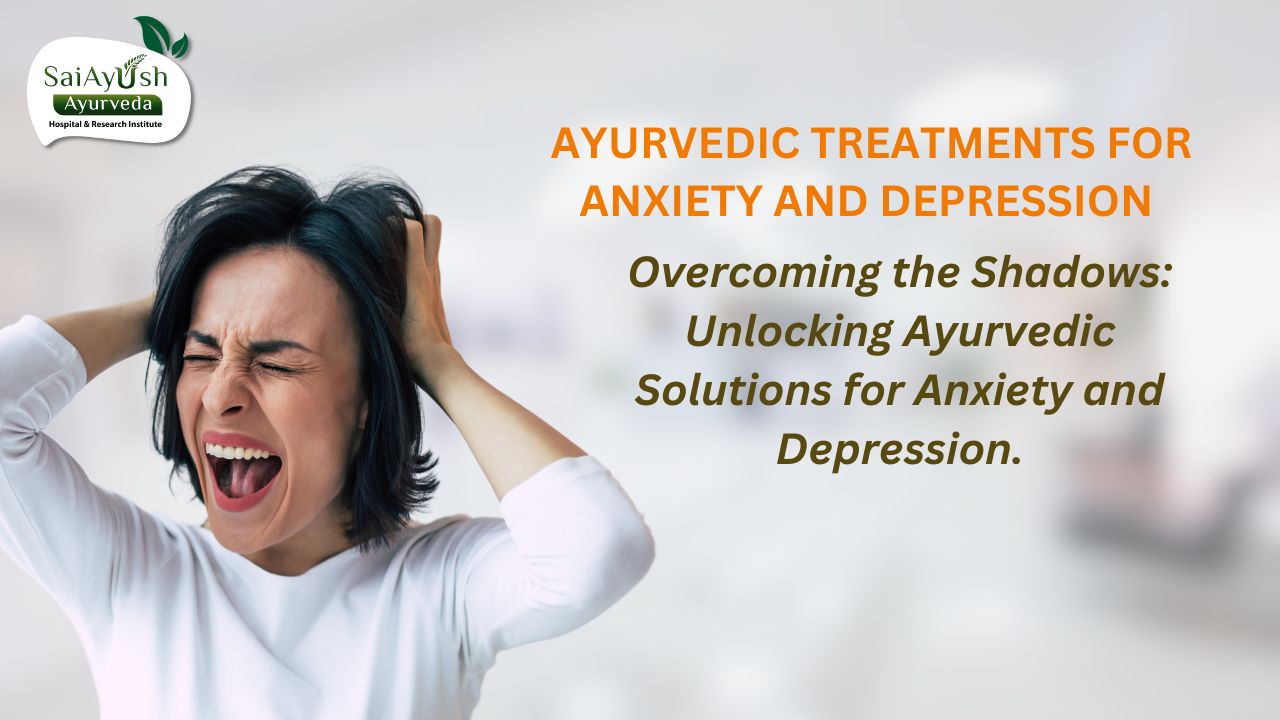Ayurvedic Treatment for Depression and Anxiety
Anxiety and depression are more prevalent than ever in today’s hectic and stressful world. These mental health conditions can significantly impact our overall well-being and quality of life. While there are various treatment options available, Ayurveda offers a holistic approach to managing anxiety and depression. In this blog, we will explore the causes, symptoms, and Ayurvedic treatment options for these conditions, along with the benefits they provide.
Understanding Anxiety and Depression
Anxiety and depression are mental health disorders that can affect individuals of all ages and backgrounds.
Anxiety is characterized by excessive worry, fear, or unease about future events or uncertain situations. It can manifest as physical symptoms such as restlessness, difficulty concentrating, muscle tension, and sleep disturbances.
Depression involves persistent feelings of sadness, loss of interest, or a lack of motivation. Individuals with depression may experience changes in appetite, energy levels, concentration, and may even have thoughts of self-harm or suicide.
Causes and Risk Factors by Anxiety and Depression
The causes of anxiety and depression can vary from person to person. Some common factors include:
- Genetics and Family History: Individuals with a family history of anxiety or depression may be more prone to developing these conditions.
- Unbalanced brain chemistry: Neurotransmitters, including serotonin and dopamine, are essential for controlling mood. An imbalance in these chemicals can contribute to the development of anxiety and depression.
- Life Events and Trauma: Stressful life events, such as the loss of a loved one, financial difficulties, or traumatic experiences, can trigger or exacerbate anxiety and depression.
- Chronic Illness or Pain: Individuals dealing with chronic health conditions or persistent pain may be more susceptible to developing anxiety and depression.
Ayurvedic Perspective on Anxiety and Depression
According to Ayurveda, an imbalance in the Vata, Pitta, and Kapha doshas is the main contributor to anxiety and depression. When these energies are out of balance, it affects both the mind and body, leading to mental health issues.
Ayurveda recognizes that each individual is unique, and treatment plans are tailored to address specific imbalances. The holistic approach of Ayurveda focuses on restoring balance and harmony within the body, mind, and spirit.
Ayurvedic Treatments for Anxiety and Depression
Ayurveda offers a range of treatments to address anxiety and depression. It focuses on creating balance in the mind and body through lifestyle modifications, herbal remedies, meditation, and yoga.
Lifestyle Modifications:
- Maintain a Regular Routine: Establishing a consistent daily routine helps bring stability and structure to your life, reducing anxiety and promoting a sense of well-being.
- Practice Mindful Eating: Choose warm, nourishing foods that are easy to digest. Avoid processed foods, caffeine, and alcohol, as they can aggravate anxiety and depression.
- Prioritize self-care: Make self-care a priority by doing things that help you unwind, like taking warm baths, using aromatherapy, or getting a relaxing massage.
Herbal Remedies:
- Ashwagandha: Known for its adaptogenic properties, ashwagandha helps reduce stress, and anxiety, and promotes overall well-being.
- Brahmi: Enhances cognitive function, improves memory, and helps reduce anxiety and depression.
- Jatamansi: Calms the mind, relieves stress, and aids in restful sleep.
Meditation and Pranayama:
- Mindfulness Meditation: Practicing mindfulness cultivates present-moment awareness, reduces stress, and enhances overall mental well-being.
- Breathing Exercises (Pranayama): Techniques like deep abdominal breathing, alternate nostril breathing, and calming breaths can help calm the mind and reduce anxiety.
Yoga and Exercise:
- Yoga Asanas: Certain yoga poses, such as forward folds, gentle twists, and restorative poses, help release tension, promote relaxation, and support emotional balance.
- Regular Exercise: Engaging in moderate-intensity exercises like walking, swimming, or cycling boosts endorphin levels, reduces stress, and uplifts mood.
Incorporating Ayurveda into Daily Life:
To truly benefit from Ayurvedic practices, it is important to integrate them into your daily life. Here are some additional tips:
- Maintain a Balanced Sleep Schedule: Prioritize getting adequate and restful sleep to support your mental and emotional well-being.
- Connect with Nature: Spend time outdoors, connect with natural surroundings, and practice grounding exercises like walking barefoot on grass or sand.
- Cultivate Healthy Relationships: Surround yourself with positive, supportive individuals who contribute to your emotional well-being.
Seeking Professional Guidance:
While Ayurveda offers valuable insights and practices, it is important to consult with an Ayurvedic practitioner or a qualified healthcare professional before starting any new treatments for anxiety and depression. They can provide personalized guidance, considering your unique constitution and specific health needs.
Conclusion
Ayurveda offers a holistic and personalized approach to managing anxiety and depression. By addressing the root causes of these mental health conditions and restoring balance within the body and mind, Ayurvedic treatments can provide significant benefits. However, it is essential to consult a qualified Ayurvedic practitioner for a comprehensive evaluation and personalized treatment plan. Take advantage of Ayurvedic wisdom to start your journey to inner peace and mental health.
Please take note that seeking professional medical advice should never be done in lieu of the information provided on this blog. If you are feeling anxious or depressed, we urge you to consult a medical expert.
Discover the healing power of Ayurveda with our latest article at Sai Ayush Ayurveda Hospitals! Dive into the age-old wisdom that can rejuvenate your body and mind. Click here to read more:


